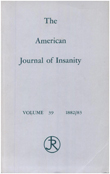Clinical effects of recent cocaine use on patients with acute schizophrenia
Abstract
OBJECTIVE: Dopamine function has been hypothesized to be involved in both producing schizophrenic symptoms and mediating cocaine's reinforcing properties. As a result, cocaine abuse in schizophrenic patients may be seen as a natural experiment that may alter the phenomenology and neurobiology of schizophrenia. This report concerns the clinical effects of cocaine abuse and cessation in schizophrenic patients at two times: when patients presented to the psychiatric emergency service and again after 4 weeks of hospitalization. METHOD: The subjects were 15 cocaine-abusing and 22 cocaine-abstaining schizophrenic patients. Diagnostic assessments were performed with the Structured Clinical Interview for DSM-III-R--Patient Version, which uses DSM-III-R criteria. All of the patients were assessed at both times with the Brief Psychiatric Rating Scale, the Scale for the Assessment of Positive Symptoms, and the Scale for the Assessment of Negative Symptoms. RESULTS: Cocaine-abusing schizophrenic patients showed fewer negative signs and more anxiety/depression at the hospital- admission assessment than their nonabusing counterparts. At retest, no group differences were detected in patients' negative signs or mood symptoms. Severity of positive symptoms was equal at both testing sessions. CONCLUSIONS: The significant difference in negative signs and mood symptoms at admission assessment was attributed to the neurobiological impact of cocaine. The role of psychostimulants in schizophrenic patients is discussed.
Access content
To read the fulltext, please use one of the options below to sign in or purchase access.- Personal login
- Institutional Login
- Sign in via OpenAthens
- Register for access
-
Please login/register if you wish to pair your device and check access availability.
Not a subscriber?
PsychiatryOnline subscription options offer access to the DSM-5 library, books, journals, CME, and patient resources. This all-in-one virtual library provides psychiatrists and mental health professionals with key resources for diagnosis, treatment, research, and professional development.
Need more help? PsychiatryOnline Customer Service may be reached by emailing [email protected] or by calling 800-368-5777 (in the U.S.) or 703-907-7322 (outside the U.S.).



